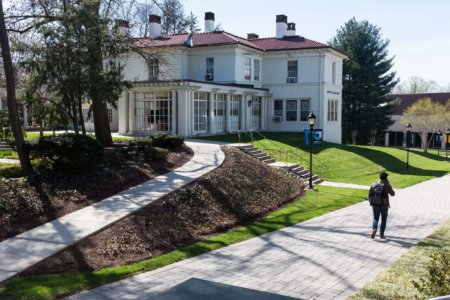The construction management industry is poised to capture growth opportunities in 2022 and beyond. Advancements are set to be made across health care, public safety, and other public infrastructure. According to Deloitte’s 2022 engineering and construction industry outlook report, the residential segment is also expected to stay strong.
Adding value to the sector as a knowledgeable professional, however, is no easy feat — evident through a skills gap partly driven by industry advances in integrating digital technologies with key work streams to enhance productivity, efficiency, and worker safety. Thankfully, Thomas Jefferson University’s College of Architecture and the Built Environment (CABE) is home to an MS in Construction Management designed to develop such talents.
“As an industry professional, I believe that the content we are teaching in this MS program is directly related to the work being done in the field,” confirms Dr. Kimberlee Zamora, who has worked in the industry for over 15 years.
True enough, the STEM-designated program provides students with the theoretical knowledge and future-focused skills needed to plan and manage each phase of the construction process as applied to complex commercial, infrastructure, and residential building projects.
Its mission is to equip learners with a broad practice-oriented understanding of construction technology, business, architecture, and engineering, with a keen emphasis on managing the entire construction process — from project inception to close-out. Upon completion, they can expect to assume leadership positions centered around building quality, timely, cost-efficient projects.
While focused, the program is anything but rigid. In fact, MS in Construction Management students are encouraged to explore the rest of Jefferson’s topical academic offerings whilst on their quest to mastery.
“This course integrates courses from graduate programs, such as Sustainable Design and Real Estate Development, and from the Business School’s Innovative MBA Program,” explains Dr. Gulbin Ozcan-Deniz. “Students are encouraged to select electives in these programs according to their interests.”
In light of the demand for more construction professionals to incorporate sustainability into their processes more cohesively and seamlessly, MS in Construction Management students are required to take on at least two sustainable construction or design courses. Faculty members are sensitive to the ethical dimension of the business as well. In this, students will be able to truly understand world-bettering methods and green rating systems such as Leadership in Energy and Environmental Design (LEED).
“Furthermore, students are introduced to project management software, Building Information Modeling, environmental project management, finances, risk management, and OSHA 30 training and develop skills necessary to complete a master’s project — which will certainly enable them to onboard to new work experiences faster than a person without this qualification,” says Dr. Zamora.

Source: Thomas Jefferson University College of Architecture & Built Environment
Experiential knowledge ensures learners can gain industry knowledge well before graduating. Jefferson’s MS in Construction Management program boasts a strong network with the construction management community in Philadelphia, which translates into valuable student opportunities, such as internships and full-time jobs.
Several faculty members work directly in the local industry and are more than willing to assist in opening doors or sharing key insights in the classroom. They constantly refine the MS curriculum to stay up to date with relevant industry practices in the Philadelphia region.
The best part? There are many construction firms in the city that are aware of Jefferson’s unique capability to produce career-ready students. Many hire MS in Construction Management graduates as projects managers, superintendents, project engineers, estimators, schedulers, safety officers, value engineers, or purchasing agents, among other lucrative positions.
To date, Amazon.com Services LLC, Clemens Construction Company, Henkels & McCoy Inc. (H&M), Hunter Roberts Construction Group, IKEA Group, INTECH Construction, LF Driscoll, the Norwood Company, the Pennsylvania Department of Transportation (PENN DOT), Thomas Jefferson University Facilities, South Eastern Transportation Authority (SEPTA), Turner, Warfel Construction Company, Whiting-Turner Contracting Company, and many other esteemed organizations have welcomed Jefferson students and graduates with open arms.
“Our international and domestic students can apply for internships for credit, meaning they will be able to work in the construction industry at a particular company and register that internship for academic credit,” explains Dr. Mohammed Mawlana. “In addition, this MS degree is designated as a Science, Technology, Engineering, and Math (STEM) program. With STEM designation, international students can receive a 24-month STEM Optional Practical Training (OPT) extension to the standard 12-month OPT.”
Recently, two MS in Construction Management degree’s most non-traditional students — who do not have a construction-related undergraduate qualification — secured full-time jobs in the field. “This reflects on the strength of the program as well as the determination of our students,” Dr. Mawlana says.
Follow Thomas Jefferson University on Facebook, Twitter, Instagram, and YouTube.













